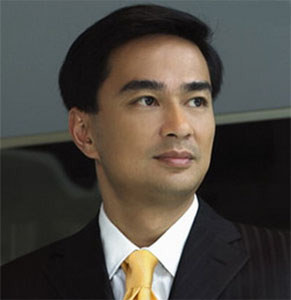ASEAN needs "new approach," Thai premier says
 Cha-am, Thailand - The 15th summit of the Association of South-East Asian Nations (ASEAN) kicked off Friday in Thailand with a call for "new approach" as the 10-nation group strives to emulate the European Union.
Cha-am, Thailand - The 15th summit of the Association of South-East Asian Nations (ASEAN) kicked off Friday in Thailand with a call for "new approach" as the 10-nation group strives to emulate the European Union.
Thai Prime Minister Abhisit Vejjajiva opened the three-day summit in Cha-am, 130 kilometres south-west of Bangkok, with a call for a more dynamic, action-based ASEAN as it moves toward its goal of achieving an integrated ASEAN Community similar to the EU by
2015.
"We have to start thinking about a new approach in the way we do things," Abhisit said. "Our institutional structures should be strengthened so that the decisions can be made promptly whereas their execution can also be done in a timely manner."
He enumerated the group's increasingly active role in 2009, such as agreeing to set up a regional financial "self-help mechanism" by year's end to cope with the global financial crisis, participation in the Group of 20 summits of the world's largest economies, joint efforts to combat swine flu and an initiative to launch a permanent emergency rice reserve with China, Japan and South Korea.
The highlight of the summit is to be the inauguration of an ASEAN Human Rights Commission Friday although critics have labelled the body in a region notorious for human rights abuses as "toothless."
The much-debated commission has been faulted for lacking independence from the 10 participating ASEAN governments, which include human rights pariah Myanmar and other poor performers such as Cambodia, Laos and Vietnam.
Commissioners on the new ASEAN human rights body are to be appointed by their respective governments, raising immediate questions about the commission's effectiveness.
The commission has no mandate to intervene in human rights violations in member countries but is to concentrate more on promoting regional understanding of human rights issues.
"The ASEAN Inter-Governmental Commission on Human Rights will have to work hard to establish itself as a credible regional mechanism and help close the gap between human rights rhetoric and the reality on the ground," said Homayapun Alizadeh, head of the UN's Office of the High Commissioner for Human Rights for South-East Asia.
ASEAN has been widely criticized in the past for not dealing with human rights abuses in its own backyard, specifically for failing to pressure Myanmar, also known as Burma, to free opposition leader Aung San Suu Kyi and more than 2,000 other political prisoners. Suu Kyi has spent 14 of the past 20 years under house detention.
Neglect of human rights and civil society are hardly limited to Myanmar in ASEAN.
On Friday, the governments of Cambodia, Laos, Myanmar the Philippines and Singapore all rejected representatives of regional civil society organizations who were scheduled to meet with the leaders in the beach resort town of Cha-am.
"It's disturbing that this is happening at a time the ASEAN Inter-Governmental Human Rights Commission is being launched," said Debbie Stothard, head of one of those groups, the Alternative ASEAN Network on Burma.
The summit was expected to see the association reiterate calls for Suu Kyi's release to allow her and other political prisoners to participate in an election scheduled next year in Myanmar.
"The request for the release of Madame Aung San Suu Kyi and all political prisoners stands," Thai Foreign Minister Kasit Piromya said before the summit's start.
The summit was also due to see the signing of declarations on food security, regional connectivity, disaster management and cultural exchanges.
Thailand is this year's chair of ASEAN, which now holds two summits per year. Next year, Vietnam is to chair the group, whose members are Brunei, Cambodia, Indonesia, Laos, Malaysia, Myanmar, the Philippines, Singapore, Thailand and Vietnam.
Besides drawing the leaders of ASEAN, the leaders of Australia, China, India, Japan, New Zealand and South Korea, ASEAN's main partners, are also scheduled to attend the summit in Cha-am. (dpa)